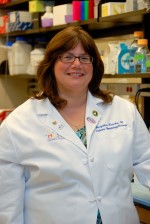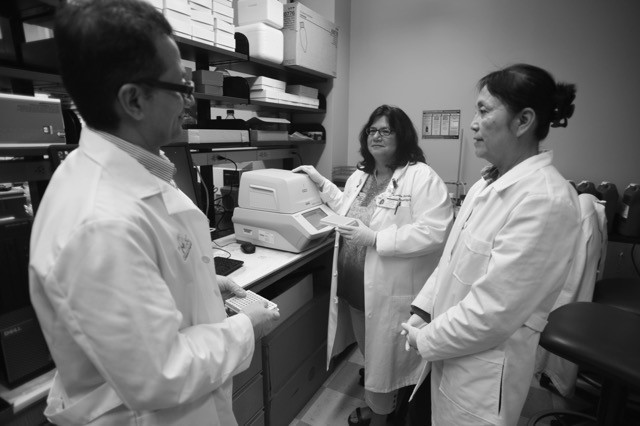A Letter From The Research Lab By Dr Kraveka
Dear Friends and Supporters of Chase After a Cure,
As we approach Childhood cancer awareness month in September, I wanted to take a moment to thank you all for your generous support. As you may be aware Whitney Ringler founded Chase After a Cure in 2009, after her son Chase was diagnosed with neuroblastoma.
Neuroblastoma is a cancer of the sympathetic nervous system. It is 3rd most common cancer overall and the most common solid tumor of infancy. Most children are diagnosed before their 4th birthday. It has one of the lowest survival rates of all childhood cancers. About half of children diagnosed with neuroblastoma will have “high risk” disease that has spread to other sites in their body. The survival rate for children with “high risk” neuroblastoma is under 30%. This means that about 70% will relapse and there are no effective cures for relapse. New treatments and approaches are urgently needed.
Funds raised by Chase After a Cure have been instrumental to my research efforts at the Medical University of South Carolina Children’s Hospital. I am a pediatric oncologist who treats patients and also has research lab. My research lab is the only one in the state dedicated to pediatric cancer research. I focus mainly on neuroblastoma and on identifying and developing new treatments for this deadly disease. The goal our research is to develop new treatments for children that will be more effective and have fewer side effects.
My laboratory research focuses on sphingolipid based therapeutics for pediatric cancers, particularly neuroblastoma. Sphingolipids make up cell membranes and play important roles in cancer cell growth. Targeting sphingolipid metabolism has been shown to be a novel and effective method of cancer cell destruction. Work from my laboratory has identified “novel” biologic functions for a type of sphingolipids called dihydroceramides. We propose that increasing dihydroceramide levels in cancer cells, with compounds that we have developed, will lead to improved cure rates. Our current research projects include:
• Identification of new biomarkers in neuroblastoma
• Developing novel inhibitors to the dihydroceramide desaturase enzyme (DEGS-1) for pediatric cancer therapy
• Studying the role ceramide sythases in high-risk neuroblastoma
• Studying the regulation on MYCN oncogene by sphingolipids and retinoid compounds
• Studying sphingosine kinase inhibitors in pediatric cancers
Sphingolipid targeted therapies have great potential for pediatric cancer therapy because they:
Can be combined with existing chemotherapeutic agents to improve clinical outcomes.
Can help overcome drug resistance.
Can enhance responses to radiation therapy
Can inhibit tumor metastases, migration, invasion, and angiogenesis.
Can have fewer side effects than conventional therapies.
I also have ongoing collaborations with several scientists:
1. Dr. Zdzislaw M. Szulc in Department of Biochemistry and Molecular Biology at MUSC. He is synthesizing novel lipid based enzyme inhibitors that we are testing in neuroblastoma.
2. Dr. Charles Smith in the Department of Pharmaceutical and Biomedical Sciences at MUSC. We are testing his oral Sphingosine Kinase 2 inhibitor in pediatric cancers. Results thus far are very encouraging and plans are underway for a national Phase I pediatric trial using this compound in 2014
3. Dr. Frank Alexis in the Bioengineering Department at Clemson University. We are collaborating on a project testing nanoparticle delivery of drugs in neuroblastoma. This approach is expected to increase the effectiveness of the drugs, while at the same time decreasing their side effects.
4. Dr. Duska Separovic in the Department of Pharmaceutical Sciences at Wayne State University. We are collaborating on the role of dihydroceramide desaturase in photodynamic therapy for solid tumors.
Our lab is a member of the Neuroblastoma and Medulloblastoma Translational Research Consortium (NMTRC). The NMTRC is a group of 18 universities and children’s hospitals headquartered at the Helen Devos Children’s Hospital that offer a nationwide network of childhood cancer clinical trials. Their mission is to create a national collaborative effort of researchers, oncologists and family advocates to bring forward new therapies for children with relapsed neuroblastoma and medulloblastoma with the goal of improving the quality of life and survival of children with neuroblastoma and medulloblastoma. Through the NMTRC we have a network in place in which we can take the discoveries made in our lab directly to patients.
As an NMTRC member I was involved in the first FDA approved pediatric personalized medicine trial for children with relapsed neuroblastoma. We have now expanded on this approach for to include all pediatric cancers. I am the Rare Tumor Study Chair of the NMTRC clinical trial, NMTRC 008: A Feasibility Trial using Molecular-Guided Therapy for the Treatment of Patients with Relapsed and Refractory Childhood Cancer. This is a multicenter study to evaluate the ability of using genome-wide expression profiles of a child’s tumor along with DNA mutation panels to predict individual therapies for patients. This study outlines an approach by which we can use our expanding knowledge of the individual genetics of tumors to understand the mechanisms, which cause tumors to grow. This knowledge is then used to identify specific targeted therapies for each patient.
We are also excited to have the FIRST neuroblastoma chemoprevention trial open at MUSC. This trial, NMTRC003: A Phase II Preventative Trial of DFMO as a Single Agent in Patients With High Risk Neuroblastoma in Remission, will evaluate a drug called DFMO in children whose neuroblastoma is in remission. The hope is that DFMO will prevent the neuroblastoma from coming back.
Your support for Chase After a Cure has resulted in 10 publications, over 200 citations, 3 invited presentations and 15 oral and poster presentations and national and international meetings. We generated preliminary data that supported our proposals for peer-reviewed funding from the National Childhood Cancer Foundation, Hyundai Hope on Wheels, Rally Foundation for Pediatric Cancer Research, and the St. Baldrick’s Foundation. Your funds have helped us:
• Support the work of 3 scientists in the lab
• Purchase key equipment for our lab such as:
o EVOS fluorescent microscope used to visualize drug treatments,
o BioTek Synergy H1 Multi-Mode Plate Reader used for cancer cell death assays, enzyme assays, cancer cell drug discovery experiments
o BioRad CFX96 Touch Real-Time PCR thermal cycler used for cancer cell gene expression analysis
• Subsidize the cost of lab experiments and consumables such as reagents, pipettes, tissue culture plates.
Thank-you again for your generous support. Only research can find a cure for cancer. Our research offers hope for a cure.
Sincerely,
Jacqueline M. Kraveka, DO
Associate Professor of Pediatrics
Director, Pediatric Oncology Research Laboratory

















